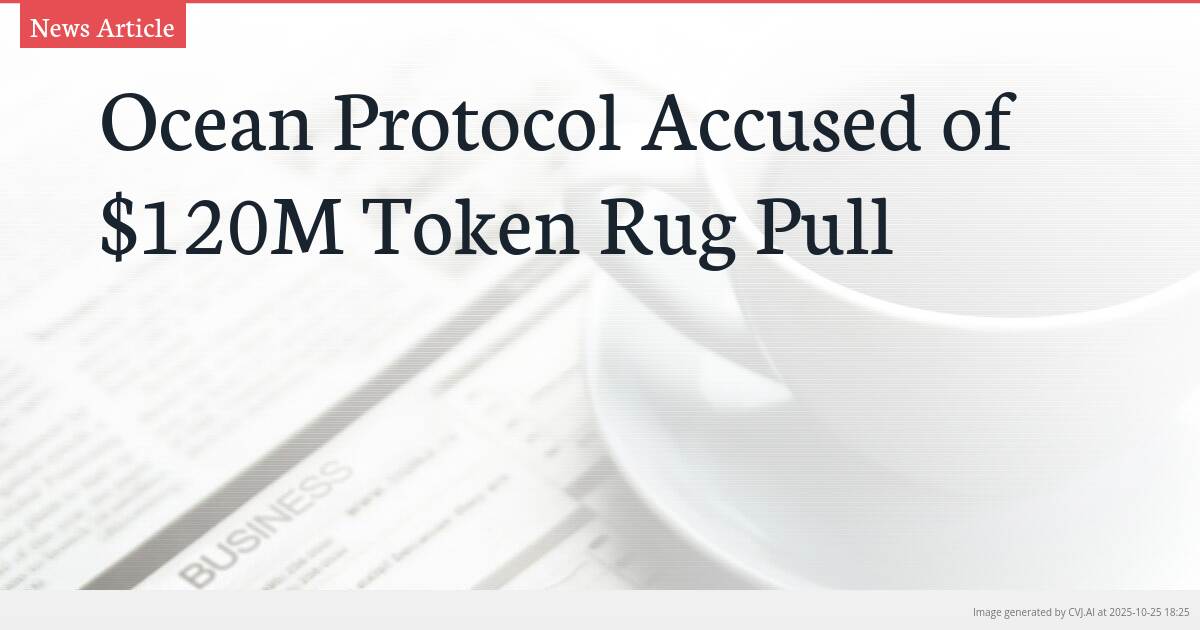This summary text is fully AI-generated and may therefore contain errors or be incomplete.
Introduction
Ocean Protocol faces explosive allegations of orchestrating a $120 million token rug pull after transferring 270 million FET tokens to cryptocurrency exchanges without notifying partners or token holders. The controversial move occurred just days after the project’s sudden exit from the ASI Alliance, triggering widespread outrage and potential legal action across the cryptocurrency community.
Key Points
- Ocean Protocol converted 661 million OCEAN tokens into 286 million FET before transferring 270 million FET ($120M) to Binance and GSR Markets
- The transfers coincided with Ocean's October 9 exit from the ASI Alliance without public explanation or disclosure to token holders
- Fetch.ai has opened class-action claims for affected holders and is demanding full transparency from Ocean Protocol regarding the token movements
The ASI Alliance Breakdown and Suspicious Timing
The ASI Alliance, formed in March 2024 as a landmark collaboration between Ocean Protocol, Fetch.ai, and SingularityNET, was designed to unite the three projects under a single token—FET. The merger allowed Ocean Protocol’s OCEAN tokens to be converted at a fixed rate to FET, creating what appeared to be a unified front in the competitive artificial intelligence and blockchain space. However, this collaborative vision began to unravel when Ocean Protocol announced its unexpected exit from the alliance on October 9, 2024, without providing any public explanation or disclosure regarding the redistribution of community tokens.
According to independent on-chain analytics from Bubblemaps, the timing of Ocean Protocol’s actions raises serious questions about the project’s intentions. On July 1, 2024, an Ocean Protocol wallet converted 661 million OCEAN tokens into 286 million FET. This conversion occurred while the project remained part of the ASI Alliance and while maintaining that substantial OCEAN reserves in team-controlled wallets were designated for community incentives and data farming programs. The conversion of such a massive token holding just months before the alliance exit suggests premeditated planning rather than a spontaneous decision.
The $120 Million Token Transfer Trail
The on-chain evidence reveals a systematic movement of tokens that has sparked the rug pull allegations. Following the initial conversion of OCEAN to FET, Ocean Protocol immediately sent 90 million FET to OTC provider GSR Markets. By August 31, the remaining 196 million FET were distributed across 30 newly created addresses, creating a complex web of transactions that could potentially obscure the ultimate destination of the funds.
By October 14, nearly all of these distributed funds—totaling approximately 270 million FET worth an estimated $120 million—had been transferred to Binance and other OTC providers. Specifically, 160 million FET went directly to Binance while 109 million FET moved to GSR Markets. These transfers coincided almost perfectly with Ocean Protocol’s October 9 exit from the ASI Alliance, creating what appears to be a coordinated effort to liquidate tokens immediately after severing alliance obligations.
The movement of tokens designated for community rewards to major exchanges and OTC desks without coordination with alliance partners or disclosure to token holders represents a fundamental breach of trust. While on-chain activity confirms the token conversions and transfers, it leaves unanswered the critical question of whether liquidation occurred and why community-allocated funds were redirected without transparency.
Community Backlash and Legal Ramifications
The FET team responded swiftly to the revelations, taking to social media platform X to publicly accuse Ocean Protocol of selling off tokens specifically intended for community rewards. Fetch.ai CEO Humayun Sheikh issued an official statement emphasizing that ‘the ASI Alliance was founded on principles of collaboration, transparency, and shared accountability.’ Sheikh further stressed that while the situation continues to evolve, his team’s focus remains on ‘protecting FET holders and upholding the integrity of the ecosystem.’
In a dramatic escalation of the conflict, Fetch.ai has opened class-action claims to help affected FET holders seek compensation. This move could potentially lead to multi-jurisdictional lawsuits and increased regulatory scrutiny of Ocean Protocol’s governance and token management practices. The legal action represents a significant threat to Ocean Protocol’s operations and reputation, as cryptocurrency projects increasingly face legal consequences for mismanagement of community funds.
Ocean Protocol’s CEO has dismissed the allegations as ‘unfounded and baseless rumors’ and promised a formal response soon. However, the broader FET community continues to demand transparency regarding several critical issues: the timing of token conversions before the alliance exit, the control structure of the OceanDAO SAFE wallet and Ocean Expedition, and the ultimate disposition of the transferred tokens. As Sheikh noted in his statement, ‘Our expectation is clear: Ocean must provide answers, and the ecosystem must learn from this moment to emerge stronger and more resilient.’
📎 Read the original article on cryptopotato.com

